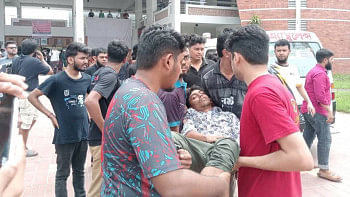Uganda seeks investment from Bangladesh
The visiting Ugandan vice-president yesterday urged Bangladeshi entrepreneurs to invest in clothing sectors in his country, as the East African country enjoys a duty- and quota-free access to markets in Europe and the US.
“Bangladesh is blessed with textile making. You could invest in the sector in our country and sell without any tariff and quota barriers,” Gilbert B Bukenya told newsmen at a press conference at the BRAC headquarters in Dhaka.
Brac Founder and Chairperson Fazle Hasan Abed said China and South Korea had initially set up garment factories in Bangladesh when there were no tariffs or quotas for Bangladesh. "Now that some tariff barriers are in place, Bangladeshi entrepreneurs may invest in Uganda to take advantage of the duty free access to export markets," Abed said.
Bukenya came to Bangladesh on Brac's invitation on May 7 and visited the NGO's sanitary napkin production centre, textile factory, poultry and livestock firms, seed processing centre, nursery, fish hatchery and dairy and food projects in Manikganj and Gazipur.
In Dhaka, Bukenya visited Arong's sales and production centres to get an idea of the socioeconomic development practices of Brac, which started projects in microfinance, education, health, agriculture, and livestock in Uganda in 2006.
“Brac has created a chain of development. I give this organisation an A-plus,” Bukenya said.
He said he was amazed to see women working on handlooms and producing fabric and Brac volunteers providing people with healthcare services.
Bukenya however said: “Stability in politics and continuity of democracy is very important for the development of a country.” Bangladesh is walking towards progress, he noted.
On the effects of the recession on developed nations in Africa, he said they were not impacted much as the their economies were not much intertwined with the banking and insurance systems of the developed countries.
Asked how the developing countries in Africa were affected due to the global economic recession, Bukenya said they were not affected that much because the economics of the developing countries are not very much integrated with the banking and insurance systems of the developed countries.
Ugandan High Commissioner to Bangladesh Nimisha J Madhvani and Defence Attaché Brigadier Geoffrey Muheesi were also present.

 For all latest news, follow The Daily Star's Google News channel.
For all latest news, follow The Daily Star's Google News channel. 



Comments